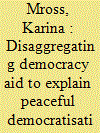|
|
|
Sort Order |
|
|
|
Items / Page
|
|
|
|
|
|
|
| Srl | Item |
| 1 |
ID:
183898


|
|
|
|
|
| Summary/Abstract |
Democratisation is hailed as a pathway to peace by some, yet, blamed for provoking renewed violence by others. Can democracy aid explain the effect of democratisation after civil war? Building upon findings that transitions to democracy are prone to violence, this article shows that external democracy aid can mitigate such negative effects. It is the first to disaggregate democracy aid and analyse its effect on peace after civil war. To this end, it uses a configurational approach and focuses on support for competition (for example, promoting free and fair elections), institutional constraints (for example, strengthening the judiciary), and cooperation (for example, facilitating reconciliation). Combining Qualitative Comparative Analysis (QCA) with an illustrative case study on Liberia, it demonstrates that democracy aid can help to prevent recurrence during postconflict democratisation. Two pathways can explain peaceful democratisation: first, fostering ‘cooperative democratisation’ characterised by substantial support for cooperation in lower-risk contexts; and second, fostering ‘controlled competition’ by combining substantial support for institutional constraints and competition. Importantly, democracy support does not trigger renewed violence. These findings speak to the academic debate on the destabilising potential of democratisation processes after civil wars and inform policymakers designing postconflict support strategies.
|
|
|
|
|
|
|
|
|
|
|
|
|
|
|
|
| 2 |
ID:
170285


|
|
|
|
|
| Summary/Abstract |
Existing research suggests that democratization can run counter to building peace in post-conflict contexts. This article analyses the effect of two competing strategies that external actors use to address the conflict of objective between democracy and peace: prioritization and gradualism. The prioritization approach advises sequencing, which means postponing support for democratization and concentrating first on peace in terms of the absence of violent conflict. The gradualist approach promotes peace and democracy simultaneously. This article offers a systematic analysis of these two prominent donor strategies. To this end, it focuses on two critical junctures in two similar post-conflict settings (Burundi and Nepal). Drawing upon extensive field research, the analysis shows that a gradualist approach is not more risk-prone than a prioritization strategy. To the contrary, the analysis suggests that even in most fragile contexts, gradualism can help to foster peace. Prioritization, in turn, may also contribute to the instability it aimed to prevent. Two factors condition the effect of the selected strategy on peace: which dimensions of democracy are affected and to what degree, and whether the institutional context reinforces or counteracts this trend.
|
|
|
|
|
|
|
|
|
|
|
|
|
|
|
|
|
|
|
|
|